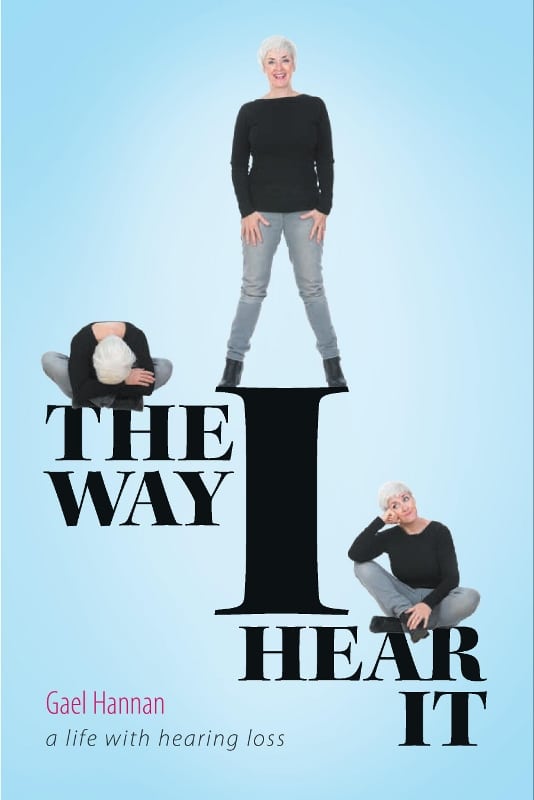Writing—about hearing loss—is on my mind this week. Here I am surrounded by the fabulous scenery of Newfoundland, as far east in Canada as you can go without falling in the Atlantic, but still, writing is never more than a few seconds away from my mind.
Firstly, David Kirkwood, the fabulous and beloved editor of HearingHealthMatters.org (HHTM), has retired after an illustrious journalism career connected to the hearing loss world. He brought me into HHTM and over the past four years he has made me a better writer. I will miss his guidance and edits: “Gael, I think what you really meant to say was….”
Secondly, I just published a book. The Way I Hear It is about—wait for it—hearing loss. A lifetime in the making, two years in the writing, and using many passages—with permission—from the almost 200 articles I’ve written here on the Better Hearing Consumer, the book is one part memoir, one part survival guide, and one part how to punch hearing loss in the nose (tips and strategies and such).
Twenty years ago, when I first became involved in hearing loss advocacy, there were few books available on the subject. The Internet as an information source was in its infancy and hearing loss was still very much in the closet. Today, all that has changed; there are many more books and an explosion of people blogging about the hearing loss or deaf life. These resources provide two of the best antidotes to the pain of hearing loss: information and inspiration. 
I love reading about hearing loss. There’s always something to learn—new strategies, new research, new technology. After the first two months of writing the Better Hearing Consumer—a new column every week—I remember thinking, “How will I keep thinking of things to write about?” But I do, because hearing loss is a subject as borderless as the universe.
As I started writing what would eventually become The Way I Hear It, I quickly learned there was more to writing a 69,000 word book than simply stringing 69 thousand-word blogs together. The weekly columns took me into some dark and dusty corners of my life, and the book took me even deeper into the life with hearing loss. I relived many painful moments, but also did more than one victory dance around my writing room, as I celebrated myself and my transition from a place of lower self-esteem to now, where I have taken charge of my own communication success.
The Hearing Husband and our son Joel were major supports through the writing process; they both believe that if you want something, you should go and do it. I agree about the should part, but the doing isn’t always easy for me. For years I yakked about writing a book, encouraged by readers and colleagues, and Doug never said, “So when are you actually going to DO it?” But eventually, I knew it was time to stop yakking and start writing.
The Hearing Husband gave me the time and space when I needed it, and my writing room changed frequently—from our home office to the front seat of the truck pulling our camper through the mountains, at the camper’s dining table as deer munched on grass 20 feet away, in the cottage while everyone else was out in the sun. Sometimes he tactfully pushed me into my daily writing with, “So, what time are you writing this afternoon? I’ll go for a walk.” So then, of course, I had to do it, because I couldn’t say “I’m not going to write today” without a good reason. Laziness was not an acceptable excuse, nor was having to feed the baby, who was now 18 and capable of getting the spoon to his mouth all by himself. Or, if he felt I’d been hunched over my laptop for too long, he would try to divert my attention. Driving through Yellowstone National Park:
“Look honey, there’s a bear!”
Me (looking up): “Is it Yogi Bear?”
“No, it’s a grizzly! On the hill looking for berries!”
Me (back at computer): “Grizzly, shmizzly. When you see Yogi and Boo Boo, let me know.”
The Way I Hear It is not only about my life, although my experiences are common to most people with hearing loss; it includes the stories of many who have gobsmacked me with their hearing loss courage and expertise—and that includes the hearing health professional. I have tried to go beyond typical hearing loss advice (“this is what a hearing aid does”, “make sure the speaker faces you”, “keep your sense of humour”), for a you-are-there book that hopefully will make you laugh and maybe even pound your fist on the table with “Yes! That’s MY life!”
If you have hearing loss, although you may never write a book, I recommend writing as a way to deal with the frustrations and anxieties of communication challenges. At the simplest level, write a piece of inspiration that gets you through the hearing loss day and stick it on the fridge. Years ago, I wrote: “It’s not just about hearing. It’s about being heard.” That still inspires me. Or ramp it up a notch and write in a journal or start a blog. It doesn’t matter who reads it or if anybody reads it. What’s important is how it makes you feel and how it helps you deal positively with your hearing loss.
That’s the way that I hear it, anyway.

The Way I Hear It: A Life with Hearing Loss is available in ebook, soft cover and hard cover formats from online retailers including FriesenPress , Harris Communications and Amazon.com. If you enjoy it, let me know. If you don’t, tell tell anybody.








Thank you Gael. You are an inspiration for me. Pat
Thank you Gael. You have been an inspiration for me. Pat
Thank you Pat. Look forward to hearing how you enjoy the book!